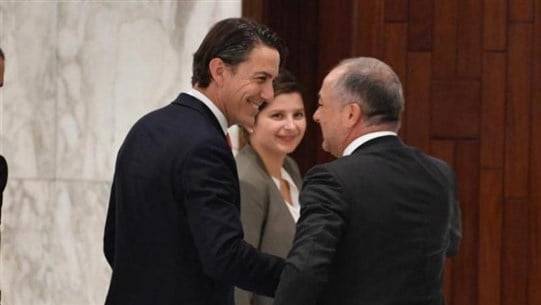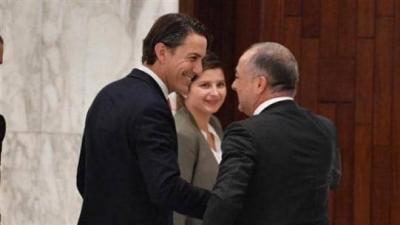Aside from the prevailing stalemate regarding presidential elections and government formation, Lebanon is making significant strides in the long-awaited demarcation of its borders. While reports confirm that the indirect agreement with Israel regarding its southern maritime borders will be signed in the middle of this week, pending the arrival of U.S. mediator Amos Hochstein in Beirut on Tuesday or Wednesday, Deputy Speaker Elias Bou Saab is preparing to lead a ministerial delegation to Syria afterward to address Lebanon's northern maritime borders. This week will likely also witness a meeting between two technical delegations: one from Lebanon and one from Cyprus, to discuss maritime borders with Cyprus.
Lebanese President Michel Aoun made a phone call last Saturday to Syrian President Bashar al-Assad, expressing Lebanon's eagerness to begin negotiations with Syria for the demarcation of their northern maritime borders. These negotiations have long been pursued by Lebanon amidst a lack of responsiveness from Syria. Official Lebanese sources told Asharq Al-Awsat that Bou Saab and his accompanying delegation will initiate the negotiations and that two technical delegations—one Lebanese and one Syrian—will formulate an agreement between the two countries regarding the demarcation of Lebanon's northern maritime borders. If a political intervention is needed later for political backing, it will be ready.
For his part, member of the "Strong Lebanon" bloc, MP Alan Aoun, indicated that negotiations with Cyprus are expected to be "easy and quick," noting in a statement to Asharq Al-Awsat that "the adjustment of the line with Cyprus will be based on the new demarcation of the southern borders, given that the previous demarcation was based on Line 1." He added, "Resolving issues with Cyprus will be swift; they initially initiated sending a letter to correct the borders. As for the demarcation with Syria, President Aoun opened the door with his call to the Syrian president, agreeing to start negotiations to correct the borders. This process will begin this week, but it is certain it will not conclude in a single round. What will occur this week is a visit from a Lebanese delegation and an agreement on the mechanism and framework for negotiation, and likely the formation of a committee from both sides for negotiations."
The announcement of the Syrian government in March 2021 of signing a contract with the Russian company "Capital" for surveying and exploring oil sparked significant Lebanese discontent, as it became evident that the maritime borders drawn by the Syrian side significantly overlapped with Block 2 on the Lebanese side. In recent hours, Lebanese voices have risen calling for the resolution of the land border file with Syria, parallel to the maritime border issue, considering that Damascus had until recently refused to recognize Lebanon's sovereignty over the Shebaa Farms at the United Nations.
Sources from the Lebanese Forces party told Asharq Al-Awsat: "The demarcation of borders with Syria should have occurred at the beginning of the new term, not in its final week. However, in any case, demarcating the borders at any time constitutes a national and sovereign demand," emphasizing that "the demarcation with Syria should start from the Lebanese Shebaa Farms, through Damascus’s official recognition of this before the United Nations, as we know that the Syrian regime does not acknowledge Lebanon's sovereignty and considers the Lebanese entity as a satellite to Syria from a Baathist perspective. Thus, we hope that what is happening is not merely a media stunt."
Dr. Sami Nader, director of the Middle East Institute for Strategic Affairs, does not seem optimistic about the land border demarcation file with Syria progressing to executive steps for several reasons: the foremost being the state of the Syrian government, which remains isolated and subject to sanctions, making it complex for it to extract oil through international companies. Furthermore, in the demarcation file with Israel, a U.S. mediator has entered the scene; what mediator might now enter the demarcation with Syria? Notably, the relationship is strained between the two countries, and they are unable to demarcate land borders while the status of displaced persons in Lebanon remains unresolved. Nader adds in a statement to Asharq Al-Awsat: "We also do not expect the Russians, who have significant influence in Syria, to facilitate such a step; it would harm their interests."




